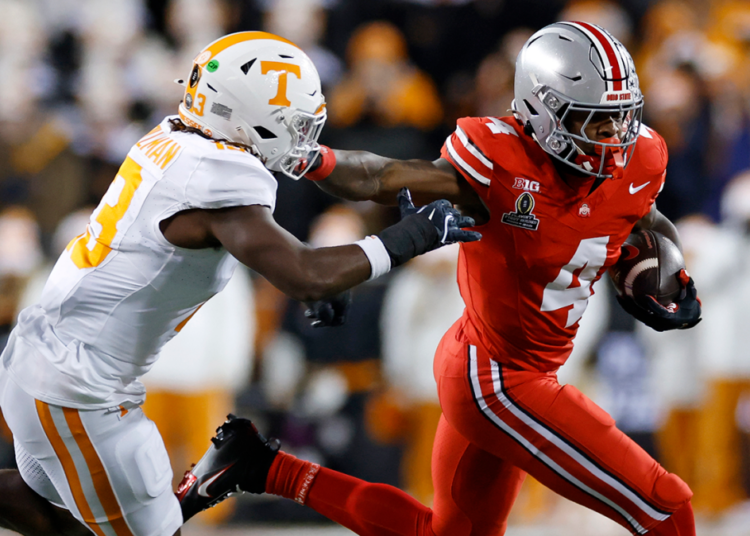Jeremiah Smith’s achievements go beyond being the most impactful freshman wide receiver in recent memory.
The 19-year-old Ohio State sensation is also among a handful of players at his age ever to get permanent total disability insurance (PTD) to protect himself against a career-ending injury, CBS Sports has learned.
Taken out by the family before the College Football Playoff, the policy not only protects Smith in the event of a football injury but in everyday life for the term of the coverage.
“If this kid steps off the curb and gets hit by a car, he’s covered,” said industry veteran Richard Giller head of insurance recovery at the Los Angeles-based Greenspoon Marder law firm. “He does not have to be injured playing football.”
Smith’s policy is with Leverage Disability and Life Insurance, an industry-leading giant in the field of athlete insurance. The Southern California-based firm was founded in 2018 by former Kansas basketball star Eric Chenowith. More than two years ago, Leverage signed Alabama’s Bryce Young and Will Anderson Jr to policies worth $20 million each, sources told CBS Sports. That $20 million total is believed to be the highest amount in history.
Industry sources say approximately four or five freshmen at this level have ever received such PTD coverage. Smith’s ability to get such coverage is based on a breakout year in which he was a national freshman of the year candidate after catching 71 passes for 1,227 yards and 14 touchdowns going into Monday’s College Football Playoff National Championship against Notre Dame.
Smith didn’t turn 19 until halfway through his first season. He currently leads the CFP field with 14 catches for 293 yards in three games.
The AP second-team All-American is already projected as a high draft choice in the 2027 NFL Draft, the earliest he would be eligible to turn pro. Per a longstanding agreement between the NFL Players Association and NFL, college players are not eligible for the draft until three years following their high school graduation.
Smith’s policy lasts until Aug. 1, 2027 or when he signs an NFL contract, whichever comes first. Ohio State administrators declined to comment on Smith’s policy.
PTD insurance covers athletes from injury that prevents them from continuing in that sport. PTD policies typically pay out a lump sum after 12 months of disability.
Since at least 2014, the NCAA has allowed schools to pay the premiums for such policies. The issue became a national talking point when Florida State paid the premiums for a $10 million policy on quarterback Jameis Winston. The policy included both a PTD policy and loss of draft value rider.
Back then, FSU was suspected of having a recruiting advantage because it paid the premiums, but other schools quickly followed the practice. In August 2022, the NCAA allowed schools to use general funds from the athletic budget to pay for premiums. That allowed schools a bigger tranche from which to draw money.
Previously, money for those premiums were only allowed to come from only a schools’ NCAA Student Assistance Fund. That money is annually distributed in June to members from the NCAA annual budget. The NCAA reported $123 million in the fund in 2023.
Smith’s premiums cost $7,500-$8,000 per million of coverage, sources told CBS Sports. In a $20 million policy, that would equal $150,000 in premiums.
PTD insurance for potential top draft choices has been available for more than a decade. Former LSU star Leonard Fournette detailed his policy for CBS Sports in 2016.
Sam Bradford, the 2008 Heisman Trophy winner at Oklahoma, had PTD insurance. Loss of draft value (LOV) coverage has been an option for about 15 years. It is purchased as a rider — or supplement to PTD — that enhances existing coverage.
PTD is not a common occurrence. However, LOV policies have many more claims because there are more injuries that can impact draft positioning.
Smith does not have LOV coverage at this time with his first crack at the draft more than two years away.
“I’ve always said you really, really, really need LOV if you are a first- or second-round draft pick,” Giller said. “Even if you had an LOV [coverage], they only offer 60% of anticipated first contract.”
That’s assuming an insurance company doesn’t dispute the payout.
In 2017, former Notre Dame linebacker Jaylon Smith collected $700,000 in one of the early loss of draft value cases.
At the time, Smith’s first contract would have been worth approximately $20 million had he stayed healthy. Smith was able to get the all-important second NFL contract, but his overall income was impacted by not being drafted higher. Smith tore his MCL and ACL in the 2016 Fiesta Bowl.
Jeremiah Smith’s family should be lauded for being proactive with their son’s coverage. Sportico reported the other side of the issue in September 2023. Future Heisman winner Travis Hunter was not insured when he suffered a lacerated liver in a game against Colorado State. In fact, none of the Buffaloes were insured, including star quarterback Shedeur Sanders.
That was quickly rectified as policies were taken out with Paradigm Gilbert Insurance Services. Managing principal Dennis Gilbert is a former MLB agent who has represented the likes of George Brett, Jose Canseco and Barry Bonds.
Industry sources questioned whether Hunter’s liver would even be covered because of the liability to the insurance company. However, there is insurance called an “exclusion buy back” where the injured part of the body can be covered with enhanced premiums.
Last month, Colorado contended it secured “record” coverage for the two stars prior to the Alamo Bowl. The school increased its PTD for the entire roster.
Paradigm Gilbert is currently being sued by former Major League pitcher Matt Garza regarding a PTD insurance claim. The case is scheduled for a jury trial Jan. 31.
Read the full article here



























Discussion about this post